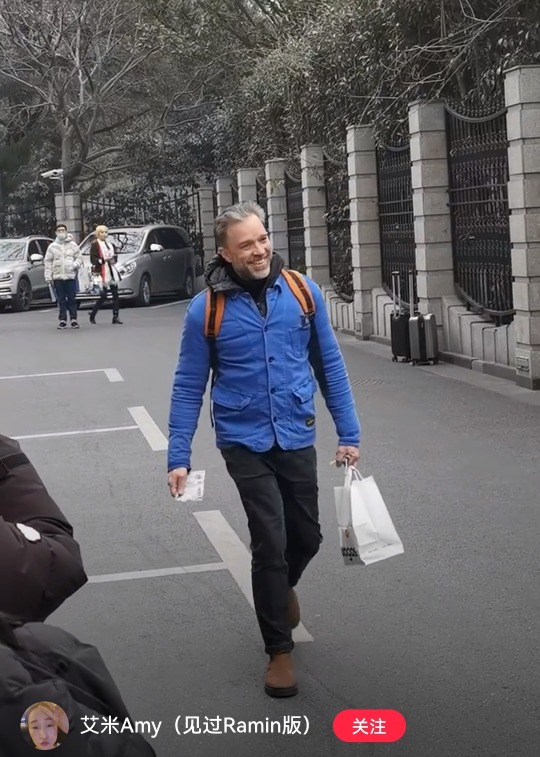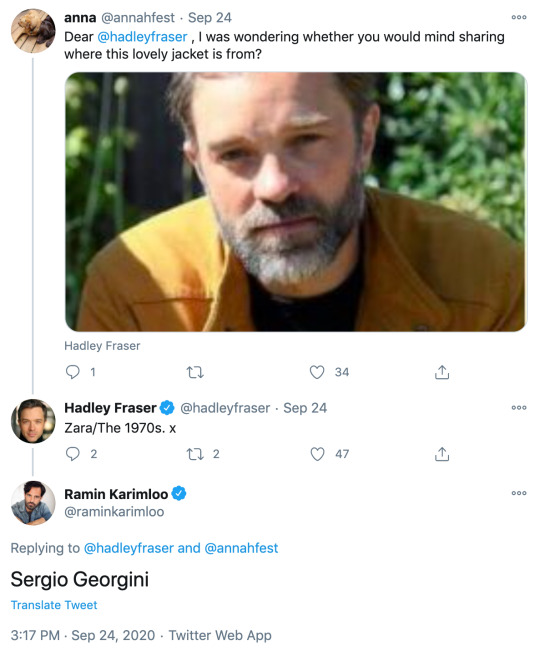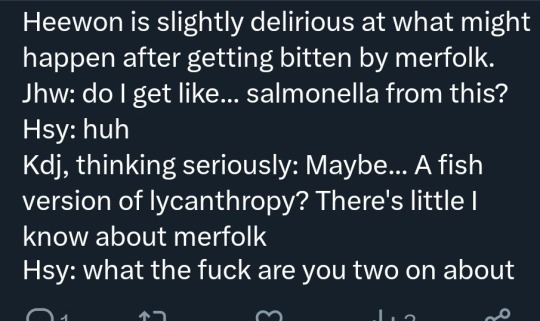#conversation review
Link
‘The Sandman’ season 1, episode 4 in conversation: ‘A Hope in Hell’
In The Sandman episode 4, the viewer finds themselves hovering over Morpheus and Matthew on their journey to Lucifer’s throne room in Hell, and huddling in the back seat of an old station wagon during a very tense road trip. Read on for our in-depth discussion of The Sandman episode 4, “A Hope in Hell.”
Natalie: So when Lucifer is talking about allying with the Dreaming, I’m thinking, what does Lucifer really feel about Dream and his power? And I asked this [of Christie at SDCC.] I asked, does she think Lucifer is jealous of Dream? Is there resentment and jealousy among the superiority?
She said that “I think that Lucifer is simultaneously laissez faire about every single person, every single creature, every single entity, and simultaneously is consumed with jealousy and shame. Consumed with it. Because going from being God’s chosen one, God’s favorite angel, to live a life entirely of punishment, you have very little.”
So perhaps the power is rather meaningless. Which is something that is a pretty important factor for another Lucifer plot down the line.
#The Sandman#neil gaiman#tom sturridge#gwendoline christie#david thewlis#sarah niles#morpheus#lucifer#john dee#episode review#conversation review#the sandman 1x04#the sandman episode 4#a hope in hell#passengers
16 notes
·
View notes
Text
i know there are people who complain that quintonreviews doesn't do interesting media analysis, but to me his videos aren't for making a well-constructed argument. there are a lot of video essayists who do that and do it well. the absurdly long nickelodeon videos are for indulging in one of my favorite pastimes: listening to someone explain the bizarre plot of a tv show I'll never watch in excruciating detail while getting incandescently, hilariously angry for reasons that take more time to explain than the run time of the source material.
#''give a secondhand plot synopsis of something you know a lot about and wish weren't hot garbage'' is 70% of my friendship with rith#the nsu miniseries is an emulation of a funny conversation i would have with a friend that i can absorb#without having to expend the energy to contribute#quinton reviews#winning tumblr roulette
20K notes
·
View notes
Text
youtube
Watch the 2024 American Climate Leadership Awards for High School Students now: https://youtu.be/5C-bb9PoRLc
The recording is now available on ecoAmerica's YouTube channel for viewers to be inspired by student climate leaders! Join Aishah-Nyeta Brown & Jerome Foster II and be inspired by student climate leaders as we recognize the High School Student finalists. Watch now to find out which student received the $25,000 grand prize and top recognition!
#ACLA24#ACLA24HighSchoolStudents#youtube#youtube video#climate leaders#climate solutions#climate action#climate and environment#climate#climate change#climate and health#climate blog#climate justice#climate news#weather and climate#environmental news#environment#environmental awareness#environment and health#environmental#environmental issues#environmental education#environmental justice#environmental protection#environmental health#high school students#high school#youth#youth of america#school
16K notes
·
View notes
Text
you want a new kind of guy, fine, i raise you: the lady i was briefly roommates with in college who once smoked a blunt at a party and then spent an hour confessing earnestly to me that she genuinely preferred reading detailed episode recaps over actually watching the tv show in question
#she sounded so remorseful & i just stood staring like an anthropologist watching their phd thesis spontaneously manifest before their eyes#apparently she would watch the pilot episode to get a feel for the characters#and then just read a bunch of recaps & episode reviews instead of watching future episodes. what fresh steaming hell#this conversation took place like a year and a half after we were roommates btw. i had seen her maybe twice in that time period#i thought she was a standard frat girl but then 18 months later she appears in the wild grass to reveal unhinged character background to me#and i'm just standing there nodding feeling like i missed a weird opportunity i did not want or ask for#honestly thought i was the weirdest person in that apartment situation but now i'm wondering what our other 2 roommates were hiding#not my strangest college experience at ALL but like. definitely top 20#this wasn't the same person as Aquarium Girl btw but oddly enough they were roommates actually#(not at the same time that Recaps Lady and i were roommates but at different intervals idk)#anyway i probably should have interviewed at more than one apartment before taking over a sublease but summer sess is a weird time u know#oh and this happened in Hong Kong btw
3K notes
·
View notes
Text
Sitting there trying to find a non-confrontational way to talk about how the lack of engagement with the fics we write is depressing as fuck. Not coming up with anything since the mood on tumblr these days is to shame writers who feel sad that 99% of their readers don't interact with the stories they share yet still read everything.
How do I explain how incredibly heartbreaking it has been to see the community aspect of fic writing/sharing DIE over the years?
#of course its unhealthy to let it affect you as a person#but how do we not talk about how PASSIVE fic reading has become??#i have been doing this TWENTY YEARS#i literally have gone through the death of fic reviews and fic comments#people used to have whole conversations and discussions in comments on livejournal#why are we not allowed to talk about this??#writing#fic writing
127 notes
·
View notes
Note
WAIT jason's murder world tour?! FROM THE EYES OF THE BATS?!??? hell YES
i feel like a lot of people just forget about his travel training, like just go Pit �� Gotham so i'm always excited to see stuff about what he got up to!! and from the bats' perspective is such mwah DELICIOUS
(in response to this and this, and maybe this, from the wip title ask game)
Wow, this is getting a lot more interest than I anticipated. And here I was worried that Incident Review was going to come across as boring.
One of the things I love about the world murder tour is that it’s canon (or it used to be - for the love of god dc, get your shit together) but it’s so vague and open-ended. So you can do anything with it. Makes my little fanfic writer brain squeal with joy.
Thanks for the ask, anon!!! 🩵
#keen converses#wip title ask game#my fic#wip#asymmetrical warfare#incident review#jason’s murder world tour#objectively the best gap year ever#jason todd#red hood#utrh au#writing rambles
42 notes
·
View notes
Text
'Cause you're hot then you're cold
- Hot N Cold, Katy Perry

Carmy’s actions in s2 are very Hot N Cold. He asks Syd out but he doesn’t show up. He invites Syd to his apartment to work on the menu but he changes his mind on the menu. He avoids Syd most of the time but he doesn’t want Marcus or Connor having Syd’s attention. He has no time to call the fridge guy but he finds time for Syd under the table. He clearly wants her but he pushes her away so I am wondering, why does Carmy act like this? Is it because he doesn’t want Syd to get too close to end up leaving again?
After Syd resigns, Carmy is devastated and his whole body really can’t believe that she just left him the restaurant. In the next episode, Tina asks when Syd is coming in but Carmy is in denial. For most of the episode, Carmy is sad and not himself. Although Syd comes back, I really don’t think Carmy got over Syd leaving him. I think Carmy’s actions in s2 was an outcome of Carmy believing that Syd could leave him at any time.
#I need them to have a conversation about what happened in the review episode because clearly Carmy is not over Syd leaving#and Syd is not over Carmy not being on board with the risotto she made#Communication needs to be a theme in s3#After the conversation they should fuck nasty#sydcarmy#the bear#sydney adamu#carmen berzatto#chef's kiss
50 notes
·
View notes
Text
youtube
Watch the American Climate Leadership Awards 2024 now: https://youtu.be/bWiW4Rp8vF0?feature=shared
The American Climate Leadership Awards 2024 broadcast recording is now available on ecoAmerica's YouTube channel for viewers to be inspired by active climate leaders. Watch to find out which finalist received the $50,000 grand prize! Hosted by Vanessa Hauc and featuring Bill McKibben and Katharine Hayhoe!
#ACLA24#ACLA24Leaders#youtube#youtube video#climate leaders#climate solutions#climate action#climate and environment#climate#climate change#climate and health#climate blog#climate justice#climate news#weather and climate#environmental news#environment#environmental awareness#environment and health#environmental#environmental issues#environmental justice#environment protection#environmental health#Youtube
16K notes
·
View notes
Text
Dressing Like Hadley Fraser, a Step by Step Guide
1. A blue shirt, to be worn outside a winter jacket (for some reason)

2. A yellow jacket, definitely not from Sergio Georgini

3. The Iconic Yellow Hat, no questions asked

4. Something that matches with a certain Ramin Karimloo, in this case shoes

Now you're all set!
Picture credits... somewhere online. They've been in my phone for so long I couldn't find the original posts...
#hadley fraser#ramin karimloo#musicals#theatre#ramley#sheytoons#was this guide helpful#leave a five star review if it was#no just kidding#inspired by a conversation with a friend
35 notes
·
View notes
Text
I really love this mutual respect and warmth between Oliver and Maxine. He really values and cares about her opinion that he even invites her to sitzprobe, which "is never done", scares Donna and Cliff and actually is done at Oliver's own peril. Maxine is critical, vitriolic, true to her own opinion, but still attentive to Oliver's feelings, she sees and sincerely appreciates his passion, she wants to see soul put into the production which is really there in the musical version and which is actually an essential part of Oliver's personality.
According to what we have seen and heard, Maxine is really what critic should be: picky, discerning, but compassionate and giving a value to this "singing", a soul
And this interaction just proves Oliver to be competent as a director, unsecured, caring about critics, lovable and ultimately passionate, which makes people who really know him to actually value him and follow him (as Charles said, "The world needs Oliver Putnams")
#Cliff may be the one who has nightmares about Maxine#but it's Oliver who literally has a heart attack after every conversation with her LMAO#and he still likes her#i love the theory that her first review is important to the case but she herself seems to be innocent#I really want to see her new review not without critics but also with the words how precious Oliver is#only murders in the building#only murders spoilers#omitb season 3#omitb#omitb s3#only murders season 3#oliver putnam#maxine
71 notes
·
View notes
Text
My love for him felt so total and so annihilating that it was often impossible for me to see him clearly at all.
— Sally Rooney, Mr Salary.
#sally rooney#books#fanart#bookworm#book quote#classic books#mr salary#normal people#conversations with friends#beautiful world where are you#tjr#book review#new books#book quotes#my quotes#marianne and connell#dark academia#light academia#love quotes#quote#quotations#bookstan
97 notes
·
View notes
Text
"trigger warning that this book has an age-gap relationship (one of them is an immortal who's hundreds of years old)" i'm begging you to grow the fuck up.
#*t#i hate what book reviews have become!!! holy shit#begging on my knees for some of y'all to go outside and have one (1) conversation with a real person
46 notes
·
View notes
Text
Madison Pauly and Henry Carnell at Mother Jones:
The conversion therapists met last November at the south end of the Las Vegas Strip. Behind the closed doors and drawn blinds of a Hampton Inn conference room, a middle-aged woman wearing white stockings and a Virgin Mary blue dress issued a call to arms to the 20-some people in attendance. “In our current culture, in which children are being indoctrinated with transgender belief from the moment they’re out of the womb, if we are confronted with a gender-confused child, you must help,” declared Michelle Cretella, a board member of the Alliance for Therapeutic Choice and Scientific Integrity. “We must do something.”
Cretella was delivering a keynote speech at the first in-person conference in four years of the Alliance, which describes itself as a “professional and scientific organization” with “Judeo-Christian values.” Its purpose: to defend and promote the practice of conversion therapy by licensed counselors.
Not that they’d call what they do “conversion therapy.” That term lacks a precise definition, but it is used colloquially to describe attempts to shift a person’s sexual orientation or gender identity. In the 1960s, some psychologists tried to make gay men straight by pairing aversive stimuli, like electric shocks or chemically induced nausea, with images of gay porn—techniques that ran the risk of causing serious psychological damage even as they failed to change participants’ sexual orientation, researchers eventually concluded. Today, “conversion therapy” generally takes the form of verbal counseling. Participants are typically conservative Christians who engage voluntarily—motivated by internalized stigma, family pressure, and the belief that their feelings are incompatible with their faith. Others are children, brought into therapy by their parents.
The American Psychological Association (APA) has concluded that conversion therapy lacks “sufficient bases in scientific principles” and that people who have undergone it are “significantly more likely to experience suicidality and depression.” Similarly, the Substance Abuse and Mental Health Services Administration (SAMHSA), part of the Department of Health and Human Services, published a report concluding that “none of the existing research supports the premise that mental or behavioral health interventions can alter gender identity or sexual orientation. Interventions aimed at a fixed outcome, such as gender conformity or heterosexual orientation…are coercive, can be harmful, and should not be part of behavioral health treatment.”
Accordingly, the Alliance and the ideas it promotes have been relegated to the scientific and political fringes. In the 2010s, as acceptance of gay rights grew rapidly, 18 states and dozens of local governments passed laws forbidding mental health professionals from attempting conversion therapy on minors.
Yet by 2020, a new front had opened in the war against LGBTQ people. Republican state legislatures started passing laws targeting transgender and nonbinary children at school—restricting their access to bathrooms, barring them from participating in sports, and stopping educators from teaching about sexual orientation or gender identity. The most intense attacks have banned doctors from providing the treatments for gender dysphoria backed by all major US medical associations. Nearly 114,000 trans youth live in states where access to puberty blockers and hormone therapy has been wiped out.
Last year, I received leaked emails illustrating how these laws are crafted and pushed by a network of anti-trans activists and powerful Christian-right organizations. The Alliance is deeply enmeshed in this constellation of actors. Although small, with an annual budget of under $200,000, it provides both unsubstantiated arguments suggesting LGBTQ identities are changeable and a network of licensed counselors to lend their credibility to these efforts. Among the collaborators were David Pickup, the Alliance’s president-elect; Laura Haynes, an Alliance advocate; and Cretella, the former executive director of an anti-trans pediatrics group who described gender-affirming medical care at the Las Vegas conference as “evil” and part of a “New World Order.” (“I’m not a conspiracy theorist,” she assured attendees. “I’m just someone who has been in the battle of the culture of life versus the culture of death long enough to see the big picture.”) All three have testified before state legislatures against gender-affirming care. When a US senator introduced a pair of bills to restrict trans youth health care in 2021, his press release quoted Cretella calling gender-affirming treatments “eugenics.”
[...]
If the Las Vegas conference made one thing clear, it’s that conversion therapy is alive and well, even in places where it’s been banned. One counselor told me he makes it a habit not to document his treatment plans in writing to avoid getting in trouble and simply treats “family dynamics” in states with conversion therapy bans.
In a 2015 survey of more than 27,000 trans adults, nearly 1 in 7 said that a professional, such as a therapist, doctor, or religious adviser, had tried to make them not transgender; about half of respondents said they were minors at the time. By applying this rate to population estimates, the Williams Institute at UCLA projects that more than 135,000 trans adults nationwide have experienced some form of conversion therapy.
Despite the data, lawmakers frequently don’t believe that conversion therapy is still happening in their community, says Casey Pick, director of law and policy at the Trevor Project, the LGBTQ suicide prevention group. “We’re constantly running up against this misconception that this is an artifact of the past,” she says. So, five years ago, the Trevor Project began scouring psychologists’ websites and books, records of public testimony, and known conversion therapy referral services, looking for counselors who said they could alter someone’s gender identity or sexual orientation.
As the research stretched on, Pick noticed webpages being revised to reflect changing times. “We saw many folks who seemed to leave the industry entirely,” she says. “But others changed their website, changed their keywords, [from] talking about creating ex-gays to talking about ex-trans.” Last December, Pick’s team published their report documenting active conversion therapists. They found more than 600 were licensed health care professionals and an additional 716 were clergy, lay ministers, or other unlicensed religious counselors.
According to Pick, some conversion therapists have embraced a new label for what they do: “gender exploratory therapy.” It’s a term that Cretella used to describe the approach she recommended, and unlike the other euphemisms thrown around at the conference, this has gained traction. In 2021, a group of therapists, who ranged from conflicted about medical interventions for kids with gender dysphoria to skeptical of the very concept of transgender identity, formed the Gender Exploratory Therapy Association (GETA) to promote an approach they characterize as neither conversion nor affirmation.
Some current and former leaders of the group, which claims a membership of 300 mental health providers, have been involved in influential organizations lobbying against gender-affirming care across the world, such as the Ireland-based Genspect and the Society for Evidence-Based Gender Medicine, a nonprofit registered in Idaho. They’ve notched some big wins: In November 2023, the UK Council for Psychotherapy—the nation’s top professional association—declared that it was fine for counselors to take GETA’s “exploratory” approach to gender. This April, a long-awaited review of gender-related care for youth in England’s National Health Service endorsed exploratory therapy, according to Alex Keuroghlian, an associate psychiatry professor at Harvard Medical School. And in the United States, in cases in which families of trans children have sued states for banning gender-affirming care, the state often calls expert witnesses who endorse “exploratory” psychotherapy as their preferred alternative treatment.
After all, the idea of “exploring” one’s gender identity sounds benign. The World Professional Association for Transgender Health, which issues guidelines on gender-affirming treatment, recommends that clinicians working with teens “facilitate the exploration and expression of gender openly and respectfully so that no one particular identity is favored.” Yet, as with mindfulness, “that term has now been hijacked by folks on the other side,” says Judith Glassgold, a clinical psychologist who chaired the APA task force that in 2009 documented the lack of science behind conversion therapy.
GETA’s guidelines instruct therapists to dig deep into “the entire landscape of the young person’s life and subjective experience,” probing all possible reasons they might identify as transgender. The catch, says Glassgold, is that “exploration” means “trying to find negative reasons why someone’s diverse.” Last year, SAMHSA issued a report saying that “approaches that discourage youth from identifying as transgender or gender-diverse, and/or from expressing their gender identity” are sometimes “misleadingly referred to as ‘exploratory therapy.’” These approaches are “harmful and never appropriate,” the report concluded.
Mother Jones has a detailed report on a new form of the medically discredited practice known as conversion therapy called gender exploratory therapy. Gender exploratory therapy is the practice of making a person revert to their gender assigned at birth, which is essentially forced detransition by another name.
Read the full story at Mother Jones.
#Gender Exploratory Therapy#Conversion Therapy#LGBTQ+#Transgender#Detransitioners#Transphobia#Alliance for Therapeutic Choice and Scientific Integrity#Michelle Cretella#David Pickup#Laura Haynes#Gender Affirming Healthcare#WPATH#Cass Review#Gender Exploratory Therapy Association#Gender Identity#Social Contagion Myth#Gender Dysphoria#Forced Detransition
17 notes
·
View notes
Link
‘The Sandman’ season 1, episode 1 in conversation: ‘Sleep of the Just’
The Sandman has arrived on Netflix at long last. All ten episodes of Neil Gaiman’s epic tale of dreams became available at once, but, much like the corresponding comic issues, every instalment is an individual masterpiece. So what else is there to do but give each one the attention it deserves? Read on for our discussion of The Sandman episode 1.
Natalie: He does Offended Cat very well. Which is what we need for Dream.
Brittany: Indeed. He’s about to get a lot more offended, annoyed, and affectionate. That big old soft heart on display.
Natalie: I mean what is The Sandman if not a bunch of people grabbing an angry cat and being like “LET ME LOVE YOU” and the cat being like “NO….. okay.”
Brittany: No better description.
#The Sandman#neil gaiman#tom sturridge#boyd holbrook#vivienne acheampong#niamh walsh#laurie kynaston#charles dance#morpheus#the corinthian#lucienne the librarian#ethel cripps#alex burgess#roderick burgess#episode review#conversation review#the sandman 1x01#the sandman episode 1#sleep of the just
19 notes
·
View notes
Text
On ‘Moral Panic’ - reviews of Captive Prince
Just re-reading the trilogy and noticed the terrible reviews of people saying it glorifies abuse, trauma, torture etc - I don’t know if it’s about individual perception but I certainly wasn’t reading the first book thinking I was supposed to be enjoying/revelling in any of the trauma - the whole book sets up how grotesque and awful the society is.
I genuinely think if you find yourself thinking the book glorifies any form of the depicted abuse then I think you probably need to have a look at yourself and how you are reacting to it….
Just my two cents.
Side note - I would be extremely interested to know if any of these reviewers liked/happily consumed Game of Thrones, it would be an interesting double standard.
#The reviews also speak to a much wider conversation about freedoms of fiction/policing fiction but that’s too deep for right now#I just couldn’t get past how many people seemed to suggest the book glorified the behaviour#I genuinely cannot see how it was glorified when I was consistently disgusted - as the author intends us to be#with the society#Damen#laurent#captive prince#lamen
96 notes
·
View notes
Text
one thing i find really difficult about navigating the IF space is the direct line of contact between readers and authors. we share the same space, and i think that plays a big part in this weird blurred line we have in this community and overall lack of boundaries.
for a lot of people this is a fun hobby and while i personally try to keep it... semi-professional most of the time, it's easy to get wrapped up in having fun on tumblr (or the forums, or reddit, wherever it is that you mainly post/interact) and have a lot of personal interactions with both readers and authors alike - which is fun! i like it more often than not, but i also think that's why a lot of comments in this space can end up being really entitled, over-familiar, and inappropriate.
it's no secret that most authors get really weird messages on here, and while this is also a problem on social media at large and not just specific to IF tumblr, it is still definitely a big problem in this community.
and to be clear i'm not saying that you can't be friendly with authors or readers (i've become friends with a handful of readers myself) and i definitely don't mean to imply that there needs to be a huge divide between us; that's silly - again, most authors are readers, most readers are authors, we’re just people on the internet sharing the same space. but all of us deserve to have our boundaries respected. this is my story, and we are strangers. as a general rule of thumb: if you wouldn't say it out loud to someone you just met, you probably shouldn't be saying it to a stranger online. especially anonymously.
#i also think this is why some criticisms get so messy in this space as well#authors should not always be in the same space as the readers/reviewers#and readers shouldnt be able to directly @ authors with their extremely negative reviews esp when it's subjective#(‘’i hate this’’ as opposed to pointing out genuinely harmful content or other criticism)#for everyone's sake#& on a kinda related note: speaking as someone who has been receiving targeted harassment for *checks watch* over two years now#some people really need to reevaluate the way they interact with certain media#i think IF feels very personal due to the interactivity and the customization of the mc#but not everything is written for you. and it's fine to just not like something#without sending weird harassing anonymous messages for 2 years straight to a stranger on the internet. lol#honestly criticism is another can of worms and that's not really what i'm talking about here#but i do think that's also part of the entitlement and overfamiliarity as well#so imo it's connected a little bit. something to think about#at the end of the day my advice to other authors about this is to know your limits and know when you need to extract yourself#and know that you don't have to respond to every ask#especially if it makes you uncomfortable#and im definitely not trying to sound like the authority here this is something i've struggled with as well#like i said it is hard to navigate#and authors can be guilty of this too. wanting to defend yourself or insert yourself into conversations where you shouldn't#i've done that myself#and i've also had other authors i dont know be way overly familiar with me in the past#all of this is just an unfortunate part of online community i think. but im trying to be more mindful about it#anyways. this post brought to you by the weird messages in my and my friends' inboxes lately#i just think you should not be telling authors about pesonal bodily functions in anonymous asks#as an example. lol#personal
398 notes
·
View notes
Text






ermm scanned some stuff... some of the orv in my sketchbook + tidbits of my silly merfolk yjh au
#rb#orv#MY OLD DRRR REVIEWER CAME HANDY👍👍👍 just cut up the bits about disaster once I read it bc I went wow this is yoocroft core!#specially the human damage <- disaster bit... God bless my notes!#okay talking abt merfolk au emmm#I made this. bc i got so sick of the mermaid Kim Dokjas I kept seeing on Twitter iwhwkw he does not have enough swag to be qualified that#<- maybe as a squid beast thing yeah but mermaid? no#Anyway I wanted to base yjh off a mythical creature like a selkie or narwhal but I just settled for some breed of shark (yet to be decided)#I first thought of yjh appearing washed up ashore somewhere and hsy and kdj find him and it's meet cute. just like little mermaid silliness#but i thought of a funnier way of them meeting 🤷♂️#cute yoohankim au meetup! your friend threw a harpoon at me 😍#<- injuries galore happened on that fishing trip... Jhw got bitten... leading to that conversation between her and kdj...#yjh is able to turn into a human but it depends on how much power she's reserved and it's under a limited time before she turns back#<- this leads to hankim saying if they're sure yjh isn't actually a siren
100 notes
·
View notes
Note
insight into Jason’s world training tour from the Bats' POV??!? you're killing me, man. (and Jay. you're going to kill Jay)
(in response to this and this from the wip title ask game)
🥺
Sorry, anon. No killing intended.
And Jay will be fine. Except for the bruises, and the blood loss, and the head injury. Oh, and the light torture. And the captivity. But we’re at least 10,000 words away from any of that!
Thanks for the ask, anon!! 🩵
#keen converses#wip title ask game#my fic#asymmetrical warfare#incident review#jason todd#red hood#batfam#utrh au
20 notes
·
View notes